Paying the Taxes
Excise taxes are due and payable without assessment or notice. If you need to make a payment when you file your quarterly return, make your payment
by check or money order payable to the United States Treasury. Write on your check or money order your employer identification number, Form 720, and
the period covered by the payment.
Floor stocks tax on ODCs.
You must deposit the floor stocks tax imposed on ODCs held on January 1, as discussed earlier, by June 30 of the year that the tax is imposed.
Deposit Requirements
If you have to file a quarterly excise tax return on Form 720, you may have to make deposits of your excise taxes before the return is due. If you
are not required to make deposits, you pay the tax when you file Form 720. See Exceptions, later.
Federal tax deposit coupons.
If you do not make your deposits electronically (discussed next), they must be accompanied by a Form 8109, Federal Tax Deposit
Coupon. If you do not have a coupon book, contact your local IRS office or call 1-800-829-1040.
Electronic deposit requirement.
You must use the Electronic Federal Tax Payment System (EFTPS) to make electronic deposits of all depository tax liabilities (including employment
taxes, corporate income tax, and excise taxes) you incur after 2001, if you meet either of the following conditions.
- You had to make electronic deposits in 2001.
- You deposited more than $200,000 in federal depository taxes in 2000.
If you do not meet these conditions, electronic deposits are voluntary.
For information about EFTPS, access it on the Internet at www.eftps.gov, or see Publication 966, Now a Full Range of Electronic
Choices to Pay ALL Your Federal Taxes.
You can enroll in EFTPS on-line or you can call:
- 1-800-945-8400, or
- 1-800-555-4477.
When To Make Deposits
These rules apply to taxes reported on Form 720 for which deposits are required.
Generally, you make deposits for a semimonthly period. A semimonthly period is the first 15 days of a month or the 16th day through the end of a
month.
All taxes are deposited under the rules for regular method taxes. However, communication and air transportation taxes can be deposited
under the rules for alternative method taxes.
All excise taxes that must be deposited are subject to the special September rules. Under these rules, an additional deposit is required in
September and different dates may apply if you are required to make electronic deposits (see Electronic deposit requirement, earlier). The
taxes for that part of the period not covered by the special rules should be deposited by the normal due date.
See Publication 509 for an Excise Tax Calendar that shows the due dates for the current year.
Regular method taxes.
Deposits of taxes (other than alternative method taxes) for a semimonthly period are due by the 14th day following the semimonthly period.
Therefore, the deposit for the first semimonthly period is due by the 29th of that month. The deposit for the second semimonthly period is due by the
14th of the following month.
If the 14th day is a Saturday, Sunday, or legal holiday in the District of Columbia, you must make the deposit by the immediately preceding
day that is not a Saturday, Sunday, or legal holiday.
September rule.
For 2002, deposit by September 27 the taxes for the period beginning September 16 and ending September 25. If making electronic deposits, deposit
by September 30 the taxes for the period beginning September 16 and ending September 26.
Make the deposit for the remaining days of the second semimonthly period in September by the regular due date.
Alternative method taxes.
You can deposit communications and air transportation taxes based on amounts considered as collected (the alternative method) rather than on
amounts actually collected.
If you use the alternative method, the tax included in amounts billed or tickets sold during a semimonthly period is considered as collected during
the first 7 days of the second following semimonthly period. You must deposit these taxes by the third banking day after that seventh day.
To use the alternative method, you must keep a separate account of the tax included in the amounts billed or tickets sold during the month. Report
on Form 720 the tax included in amounts billed or tickets sold and not the amount of tax that is actually collected.
Example.
Under the alternative method, the tax included in amounts billed or tickets sold between March 1 and March 15, 2002, is considered collected during
the first 7 days of April 2002. The deposit of these taxes is due by April 10, 2002, 3 banking days after April 7. These amounts are reported on the
Form 720 for the second quarter of 2002.
September rule.
For 2002, deposit by September 27 the communications and air transportation taxes included in the amounts billed or tickets sold during the period
beginning September 1 and ending September 10. If making electronic deposits, deposit by September 30 the air transportation and communications taxes
included in the amounts billed or tickets sold during the period beginning September 1 and ending September 11.
 Report alternative method taxes deposited under the September rule on Form 720 for the 4th quarter.
Report alternative method taxes deposited under the September rule on Form 720 for the 4th quarter.
Make the deposit for the remaining days of the first semimonthly period in September by the regular due date.
Amount of Deposits
Deposits for a semimonthly period generally must be at least 95 percent of the net tax liability for that period unless the safe harbor rule
(discussed later) applies. Generally, you do not have to make a deposit for a period in which you incurred no tax liability.
Net tax liability.
Your net tax liability is your tax liability for the period minus any claims on Schedule C (Form 720) for the period. You may figure your net tax
liability for a semimonthly period by dividing your net liability incurred during the calendar month by two. If you use this method, you must use it
for all semimonthly periods in the calendar quarter.
September rule.
To figure your net tax liability under the September rule, see sections 40.6302(c)-2 and, for alternative method taxes, 40.6302(c)-3 of
the regulations.
Safe Harbor Rule
You can use the safe harbor rule to figure if you have deposited a sufficient amount of tax. The rules apply separately to regular method taxes and
alternative method taxes.
The safe harbor rule applies to persons who filed a Form 720 for the second calendar quarter (the look-back quarter) preceding the current quarter.
If you filed for the look-back quarter, you will meet the semimonthly deposit requirement for the current quarter if all the following conditions are
met.
- The deposit of that tax for each semimonthly period in the current quarter is not less than 1/6 (16.67%) of the net tax liability reported
for that tax for the look-back quarter.
- Each deposit is timely made.
- Any underpayment for the current quarter is paid by the due date of the return.
- For regular method taxes, liability does not include any tax that was not imposed, or a tax on a chemical not subject to tax, at all times
during the look-back quarter.
- For alternative method taxes, liability does not include any tax that was not imposed at all times during the look-back quarter and the
month preceding the look-back quarter.
- For the semimonthly period for which the additional deposit is required (September rule), the additional deposit must be at least 11/90
(12.23%), 10/90 (11.12%) for non-EFTPS, of the net tax liability reported for the look-back quarter.
Tax rate increases.
You must modify the safe harbor rule if there has been an increase in the rate of tax. You must figure your tax liability in the look-back quarter
as if the increased rate had been in effect. To qualify for the safe harbor rule, your deposits cannot be less than 1/6 of the refigured tax
liability.
Exceptions
You do not have to make deposits of taxes in the following situations. You pay these taxes when you file your Form 720 for the quarter.
- The liability is for taxes on the following items.
- Sport fishing equipment.
- Electric outboard motors and sonar devices.
- Bows.
- Arrow components.
- Fuels used on inland waterways.
- Alcohol sold as fuel but not used as fuel.
- The taxes are reportable on a one-time filing. (See the earlier discussion, One-time filing, under Filing Form
720.)
- The net liability for taxes listed in Part I of Form 720 does not exceed $2,500 for the quarter.
- The tax liability is for the removal of a batch of gasohol from an approved refinery by bulk transfer, if the refiner elects to treat itself
for that removal as not registered.
Credits and Refunds
A credit may be claimed on Schedule C of Form 720 or a refund may be claimed on Form 8849 for the credits and refunds described previously.
To file a claim for a credit on Schedule C, you must have a tax liability to report on Form 720 for the quarter. If you have no tax liability for
the quarter, you must use Form 8849 to file a claim for a refund.
Generally, claims must be filed within 3 years of the filing of the return reporting the tax to which the claim relates, or 2 years from when the
tax reported on the return was paid, whichever is later. A return filed before the due date is considered to have been filed on the due date.
See Publication 378 for claims by ultimate purchasers of fuels and registered ultimate vendors, including information on when to file.
For specific information on claiming a credit or refund for a particular excise tax, see the discussion about that tax.
Tax on Wagering
The following two taxes are imposed on wagering activities.
- Occupational tax. You must pay the occupational tax if you accept taxable wagers for yourself or another person. See Form 11-C,
later, for more information.
- Wagering tax. You must pay the tax on wagering if you are in the business of accepting wagers or running a wagering pool or lottery. You
must also pay the tax on wagering if you have not properly registered the name and address of your principal on Form 11-C. See Form 730,
later, for more information.
Exempt organizations.
Organizations exempt from income tax under section 501 or 521 of the Internal Revenue Code are not exempt from the tax on wagering or
the occupational tax. However, see Lottery, later, for an exception.
Confidentiality.
No Treasury Department employee may disclose any information that you supply in relation to the wagering taxes, unless necessary to administer or
enforce the Internal Revenue laws.
Definitions
The following definitions apply to Form 11-C and Form 730.
Principal.
A principal is a person who is in the business of accepting wagers for his or her own account. This is the person who makes profit or risks loss
depending on the outcome of the event or contest for which the wager is accepted.
Agent.
This is the agent of the principal who accepts wagers for the principal.
Wagers.
Wagers include any wager:
- Made on sports events or contests with a person in the business of accepting wagers,
- Placed in a wagering pool on a sports event or contest, if the pool is conducted for profit, or
- Placed in a lottery conducted for profit.
Sports event.
A sports event includes every type of amateur, scholastic, or professional sports competition, such as:
| Auto racing |
Baseball |
Basketball |
| Billiards |
Bowling |
Boxing |
| Cards |
Checkers |
Cricket |
| Croquet |
Dog racing |
Football |
| Golf |
Gymnastics |
Hockey |
| Horse racing |
Lacrosse |
Rugby |
| Soccer |
Squash |
Tennis |
| Track |
Tug of war |
Wrestling |
Contest.
A contest is any competition involving speed, skill, endurance, popularity, politics, strength, or appearance, such as the following.
- Elections.
- The outcome of nominating conventions.
- Dance marathons.
- Log-rolling contests.
- Wood-chopping contests.
- Weightlifting contests.
- Beauty contests.
- Spelling bees.
Wagering pool.
A wagering pool conducted for profit includes any method or scheme for giving prizes to one or more winning bettors based on the outcome of a
sports event, a contest, or a combination or series of these events or contests if the wagering pool is managed and conducted for the purpose of
making a profit. A wagering pool or lottery may be conducted for profit even if a direct profit does not occur. If you operate the wagering pool or
lottery with the expectation of a profit in the form of increased sales, attendance, or other indirect benefits, you conduct it for profit.
Lottery.
This includes the numbers game, policy, punch boards, and similar types of wagering. In general, a lottery conducted for profit includes any method
or scheme for the distribution of prizes among persons who have paid or promised to pay for a chance to win the prizes. The winning prizes are usually
determined by the drawing of numbers, symbols, or tickets from a wheel or other container or by the outcome of a given event.
It does not include either of the following kinds of events.
- Games of a type in which usually the wagers are placed, winners are determined, and the prizes are distributed in the presence of everyone
who placed a wager.
- Drawings conducted by a tax-exempt organization, if the net proceeds of the drawing do not benefit a private shareholder or individual.
Card games, roulette games, dice games, bingo, keno, and gambling wheels usually fall within exception (1) above.
Form 11-C
You use Form 11-C to register with the IRS certain information on wagering activity and to pay the occupational tax on
wagering. Your canceled check is proof of registration and payment.
Who must file.
You must file Form 11-C if you are a principal or an agent, defined earlier.
When to file.
You must file your first Form 11-C before you begin accepting wagers. After that, file a renewal return by July 1 for each year that you
accept wagers. You may also be required to file a first return for a new entity created when certain changes in ownership or control occur. In
addition, you are required to file a supplemental registration when certain events occur. See the Form 11-C instructions.
Information required.
Follow the instructions on the back of the form. All filers must have an employer identification number (EIN). You cannot use your social security
number. If you do not have an EIN, you need to file Form SS-4, Application for Employer Identification Number. You can get a Form
SS-4 from the IRS or from the Social Security Administration. If you do not receive an EIN by the time a return is due, file your return anyway
and write Applied for and the date you applied in the space for the EIN. See the Form SS-4 instructions for how to file.
If you are a principal, you must show the number of agents that accept wagers for you and their names, addresses, and EINs. If you engage a new
agent after filing Form 11-C, you must file a supplemental registration showing this information within 10 days after you engage the agent.
Agents must show the name, address, and EIN of each of their principals. If you are engaged by a new principal after having filed a Form
11-C, you must file a supplemental registration within 10 days after being engaged by the new principal. If you do not provide the required
information about the principal, you will be liable for the excise tax on wagers you accept as if you were the principal.
Example.
Ken operates a numbers game and engages 10 people to receive wagers from the public on his behalf. Ken also employs a secretary and a bookkeeper.
Ken and each of the 10 agents are liable for the tax. They must each file Form 11-C. The secretary and the bookkeeper are not liable for the tax
unless they also accept wagers for Ken.
On Ken's Form 11-C, he lists all required information (name, address, and EIN) for each of his ten agents as well as himself. He does not
list his secretary or bookkeeper.
Each of the 10 agents file Form 11-C showing his or her name, address, and EIN, as well as Ken's.
Figuring the tax.
The following tax must be paid annually for every year in which taxable wagers are accepted.
- $50 if all wagers accepted are authorized under the laws of the state in which accepted.
- $500 for all other wagers.
The tax year begins on July 1. If you start accepting wagers after July 31, the tax is prorated for the first year. The prorated amounts are
shown in the table in the Form 11-C instructions.
Refund.
A refund for an overpayment of the occupational tax may be claimed on Form 8849 using Schedule 6. See the Form 8849 instructions for details.
Form 730
Form 730 is used for figuring the tax on wagers. The wagering tax applies to the wagers (as defined earlier), regardless of the outcome of the
individual wagers.
The tax applies only to a wager that meets either of the following conditions.
- It is accepted in the United States.
- It is placed by a person who is in the United States with a U.S. citizen or resident, or in a wagering pool or lottery conducted by a U.S.
citizen or resident.
Wagers made within the United States are taxable regardless of the citizenship or place of residence of the parties to the wager.
Laid-off wagers.
Persons accepting more wagers than they are willing to carry may lay off a portion of the wagers with another person to avoid the risk of loss. If
you accept a wager taken initially by someone else (other than an agent acting for you) include the wager in your gross receipts. If you accept a
wager and lay off all or part of it with a person who is liable for the tax, you may be entitled to a credit or refund, discussed later.
Excluded wagers.
Tax is not imposed on any of the following.
- Parimutuel wagering, including horse racing, dog racing, and jai alai when licensed under state law.
- Coin-operated devices such as pinball machines.
- Sweepstakes, wagering pools, or lotteries that are conducted by an agency of a state if the wager is placed with the state agency or its
authorized agents or employees.
Figuring the tax.
The amount of the wager is the amount risked by the bettor, including any fee or charge incident to placing the wager. It is not the amount that
the bettor stands to win.
The tax is 2% of the wager if it is not authorized under the laws of the state in which accepted. If the wager is authorized, the rate is 0.25% of
the wager.
When to file.
File Form 730 for each month by the last day of the following month. File a return whether or not you have taxable wagers to report. If you have
none to report, write 0 in the last box of the dollar amount column. If you stop accepting wagers permanently, check the final return box on
the form.
Credit or refund.
A credit or refund may be claimed for an overpayment of the wagering tax or for the amount of tax imposed on a wager that is laid off with another
person who is liable for the tax on the amount laid off. Claim a credit on line 5 of Form 730 or file a claim for refund on Form 8849 using Schedule
6. No credit or refund will be allowed unless the timely filed claim has the required statements, certificates, and consents attached. For more
information, see the instructions for Form 730 and Form 8849.
Conditions to allowance.
One of the following statements must be attached to the claim for credit or refund.
- The tax has not been collected from the person who placed the wager.
- The tax has been repaid to that person.
- The written consent of that person to make the claim has been obtained.
If the claim is for a laid-off wager accepted by the claimant, the statement must be attached for both the person who placed the laid-off wager and
the person who placed the original wager.
 Each person liable for the wagering tax must keep records to reflect each day's operations. Your records should include the following information.
Each person liable for the wagering tax must keep records to reflect each day's operations. Your records should include the following information.
- The gross amount of all wagers accepted.
- The gross amount of each class or type of wager accepted on each event, contest, or other wagering medium.
- The gross amount of any wagers laid off with other persons and the name, address, and registration number of each person with whom you
placed the laid-off wagers.
For more information on records, see sections 44.4403-1 and 44.6001-1 of the regulations.
Penalties and Interest
Penalties and interest may result from any of the following acts.
- Failing to collect and pay over tax as the collecting agent (see Trust fund recovery penalty, next).
- Failing to keep adequate records.
- Failing to file returns.
- Failing to pay taxes.
- Filing returns late.
- Filing false or fraudulent returns.
- Paying taxes late.
- Failing to make deposits.
- Depositing taxes late.
- Making false statements relating to tax.
- Failing to register.
- Misrepresenting that tax is excluded from the price of an article.
Trust fund recovery penalty.
If you provide taxable communications or air transportation services, you have to collect excise taxes (as discussed earlier) from those persons
who pay you for those services. You must pay over these taxes to the U.S. Government.
If you willfully fail to collect or pay over these taxes, or if you evade or defeat them in any way, the trust fund recovery penalty may apply.
Willfully means voluntarily, consciously, and intentionally. The trust fund recovery penalty equals 100% of the taxes not collected or not paid over
to the U.S. Government.
The trust fund recovery penalty may be imposed on any person responsible for collecting, accounting for, and paying over these taxes. If this
person knows that these required actions are not taking place for whatever reason, the person is acting willfully. Paying other expenses of the
business instead of paying the taxes is willful behavior.
A responsible person can be an officer or employee of a corporation, a partner or employee of a partnership, or any other person who had
responsibility for certain aspects of the business and financial affairs of the employer (or business). This may include accountants, trustees in
bankruptcy, members of a board, banks, insurance companies, or sureties. The responsible person could even be another corporation - in other
words, anyone who has the duty and the ability to direct, account for, or pay over the money. Having signature power on the business checking account
could be a significant factor in determining responsibility.
Examination and Appeal Procedures
If your excise tax return is examined and you disagree with the findings, you can get information about audit and appeal procedures from
Publication 556, Examination of Returns, Appeal Rights, and Claims for Refund. An unagreed case involving an excise tax covered in this
publication differs from other tax cases in that you can only contest it in court after payment of the tax by filing suit for a refund in the United
States District Court or the United States Court of Federal Claims.
Rulings Program
The IRS has a program for assisting taxpayers who have technical problems with tax laws and regulations. The IRS will answer inquiries from
individuals and organizations about the tax effect of their acts or transactions. The National Office of the IRS issues rulings on those matters.
A ruling is a written statement to a taxpayer that interprets and applies tax laws to the taxpayer's specific set of facts. There are also
determination letters issued by IRS directors and information letters issued by IRS directors or the National Office.
There is a fee for most types of determination letters and rulings. For complete details of the rulings program, see Publication 1375,
Procedures for Issuing Rulings, Determination Letters, and Information Letters, etc.
How To Get Tax Help
You can get help with unresolved tax issues, order free publications and forms, ask tax questions, and get more information from the IRS in several
ways. By selecting the method that is best for you, you will have quick and easy access to tax help.
Contacting your Taxpayer Advocate.
If you have attempted to deal with an IRS problem unsuccessfully, you should contact your Taxpayer Advocate.
The Taxpayer Advocate represents your interests and concerns within the IRS by protecting your rights and resolving problems that have not been
fixed through normal channels. While Taxpayer Advocates cannot change the tax law or make a technical tax decision, they can clear up problems that
resulted from previous contacts and ensure that your case is given a complete and impartial review.
To contact your Taxpayer Advocate:
- Call the Taxpayer Advocate at
1-877-777-4778.
- Call the IRS at 1-800-829-1040.
- Call, write, or fax the Taxpayer Advocate office in your area.
- Call 1-800-829-4059 if you are a
TTY/TDD user.
For more information, see Publication 1546, The Taxpayer Advocate Service of the IRS.
Free tax services.
To find out what services are available, get Publication 910, Guide to Free Tax Services. It contains a list of free tax publications
and an index of tax topics. It also describes other free tax information services, including tax education and assistance programs and a list of
TeleTax topics.
 Personal computer. With your personal computer and modem, you can access the IRS on the Internet at www.irs.gov. While
visiting our web site, you can:
Personal computer. With your personal computer and modem, you can access the IRS on the Internet at www.irs.gov. While
visiting our web site, you can:
- Find answers to questions you may have.
- Download forms and publications or search for forms and publications by topic or keyword.
- View forms that may be filled in electronically, print the completed form, and then save the form for recordkeeping.
- View Internal Revenue Bulletins published in the last few years.
- Search regulations and the Internal Revenue Code.
- Receive our electronic newsletters on hot tax issues and news.
- Get information on starting and operating a small business.
You can also reach us with your computer using File Transfer Protocol at ftp.irs.gov.
 TaxFax Service. Using the phone attached to your fax machine, you can receive forms and instructions by calling
703-368-9694. Follow the directions from the prompts. When you order forms, enter the catalog number for the form you need. The
items you request will be faxed to you.
TaxFax Service. Using the phone attached to your fax machine, you can receive forms and instructions by calling
703-368-9694. Follow the directions from the prompts. When you order forms, enter the catalog number for the form you need. The
items you request will be faxed to you.
For help with transmission problems, call the FedWorld Help Desk at 703-487-4608.
 Phone. Many services are available by phone.
Phone. Many services are available by phone.
- Ordering forms, instructions, and publications. Call 1-800-829-3676 to order current and prior year
forms, instructions, and publications.
- Asking tax questions. Call the IRS with your tax questions at 1-800-829-1040.
- TTY/TDD equipment. If you have access to TTY/TDD equipment, call 1-800-829- 4059 to ask tax
questions or to order forms and publications.
- TeleTax topics. Call 1-800-829-4477 to listen to pre-recorded messages covering various tax
topics.
Evaluating the quality of our telephone services. To ensure that IRS representatives give accurate, courteous, and professional answers,
we evaluate the quality of our telephone services in several ways.
- A second IRS representative sometimes monitors live telephone calls. That person only evaluates the IRS assistor and does not keep a record
of any taxpayer's name or tax identification number.
- We sometimes record telephone calls to evaluate IRS assistors objectively. We hold these recordings no longer than one week and use them
only to measure the quality of assistance.
- We value our customers' opinions. Throughout this year, we will be surveying our customers for their opinions on our service.
 Walk-in. You can walk in to many post offices, libraries, and IRS offices to pick up certain forms, instructions, and publications. Some
IRS offices, libraries, grocery stores, copy centers, city and county governments, credit unions, and office supply stores have an extensive
collection of products available to print from a CD-ROM or photocopy from reproducible proofs. Also, some IRS offices and libraries have the Internal
Revenue Code, regulations, Internal Revenue Bulletins, and Cumulative Bulletins available for research purposes.
Walk-in. You can walk in to many post offices, libraries, and IRS offices to pick up certain forms, instructions, and publications. Some
IRS offices, libraries, grocery stores, copy centers, city and county governments, credit unions, and office supply stores have an extensive
collection of products available to print from a CD-ROM or photocopy from reproducible proofs. Also, some IRS offices and libraries have the Internal
Revenue Code, regulations, Internal Revenue Bulletins, and Cumulative Bulletins available for research purposes.
 Mail. You can send your order for forms, instructions, and publications to the Distribution Center nearest to you and receive a response
within 10 workdays after your request is received. Find the address that applies to your part of the country.
Mail. You can send your order for forms, instructions, and publications to the Distribution Center nearest to you and receive a response
within 10 workdays after your request is received. Find the address that applies to your part of the country.
- Western part of U.S.:
Western Area Distribution Center
Rancho Cordova, CA 95743-0001
- Central part of U.S.:
Central Area Distribution Center
P.O. Box 8903
Bloomington, IL 61702-8903
- Eastern part of U.S. and foreign addresses:
Eastern Area Distribution Center
P.O. Box 85074
Richmond, VA 23261-5074
 CD-ROM. You can order IRS Publication 1796, Federal Tax Products on CD-ROM, and obtain:
CD-ROM. You can order IRS Publication 1796, Federal Tax Products on CD-ROM, and obtain:
- Current tax forms, instructions, and publications.
- Prior-year tax forms and instructions.
- Popular tax forms that may be filled in electronically, printed out for submission, and saved for recordkeeping.
- Internal Revenue Bulletins.
The CD-ROM can be purchased from National Technical Information Service (NTIS) by calling 1-877-233-6767 or on the
Internet at www.irs.gov. The first release is available in mid-December and the final release is available in late January.
IRS Publication 3207, Small Business Resource Guide, is an interactive CD-ROM that contains information important to small businesses.
It is available in mid-February. You can get one free copy by calling 1-800-829-3676 or visiting the IRS web site at
www.irs.gov.
Appendix A
This appendix provides information about ATF forms you may have to use to report certain excise taxes not covered in this publication.
 Bureau of Alcohol, Tobacco, and Firearms (ATF).
If you need forms or more information about the ATF forms, write to or call:
Bureau of Alcohol, Tobacco, and Firearms (ATF).
If you need forms or more information about the ATF forms, write to or call:
National Revenue Center
Special Occupational Tax
550 Main Street
Cincinnati, OH 45202
(513) 684-2979 or 1-800-937-8864
National Revenue Center
Excise Tax
550 Main Street
Cincinnati, OH 45250-3263
(513) 684-3334 or 1-800-398-2282
ATF Form 5630.5: Alcohol, Tobacco; ATF Form 5630.7: Firearms
A number of excise taxes apply to alcoholic beverages, tobacco products, and firearms. If you produce, sell, or import guns, tobacco, or alcoholic
products, or if you manufacture equipment for their production, you may be liable for one or more excise taxes. Use Form 5630.5 (Alcohol, Tobacco) or
Form 5630.7 (Firearms), Special Tax Registration and Return, to register your place of business and pay an annual tax. The businesses
covered by Form 5630.5 include the following.
- Brewers and dealers of liquor, wine, or beer.
- Distillers, importers, wholesale and retail dealers of distilled spirits.
- Manufacturers who use alcohol to produce nonbeverage products.
- Importers and wholesalers of imported perfumes.
The businesses covered by Form 5630.7 include manufacturers, importers, and dealers in firearms (National Firearms Act).
ATF Form 5300.26: Firearms
Use ATF Form 5300.26, Federal Firearms and Ammunition Excise Tax Return, to determine your firearms excise tax liability. Mail all
domestic firearms excise tax returns to the special purpose post office box (lockbox) as indicated on the return form. File returns for Puerto Rico
and Virgin Islands with the Chief, Puerto Rico Operations, Alcohol, Tobacco, and Firearms.
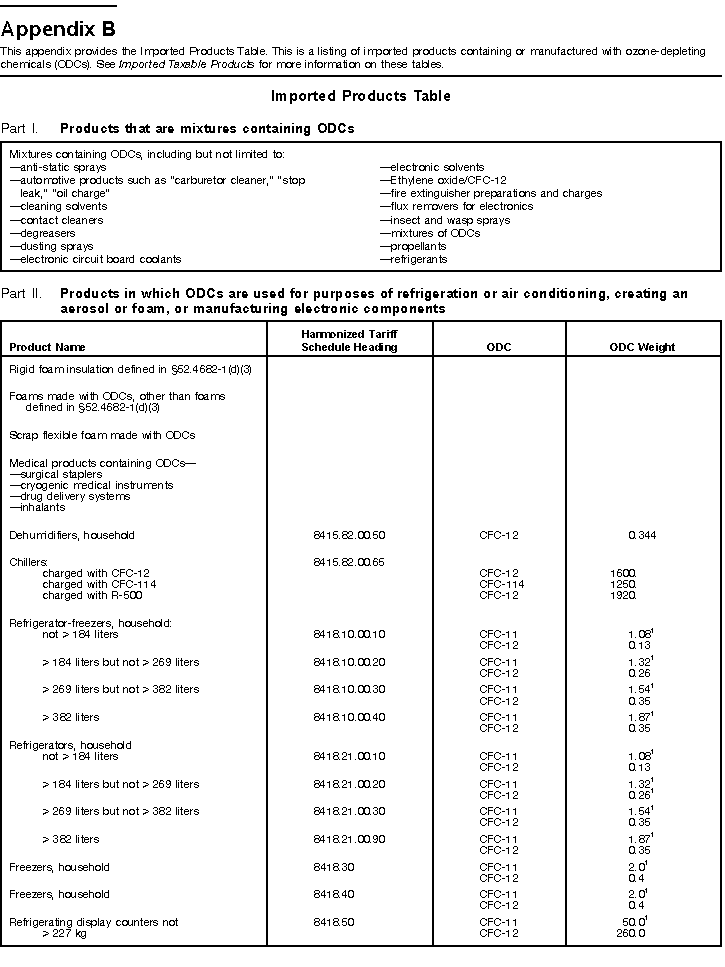
Imported Products Table, Parts I and II
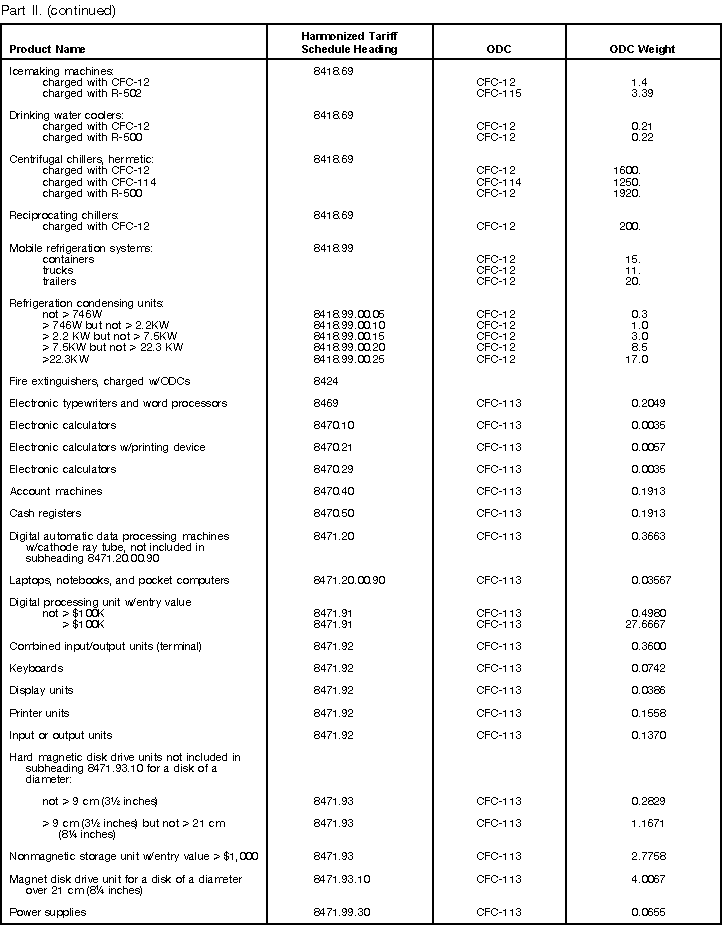
Imported Products Table, Part II continued
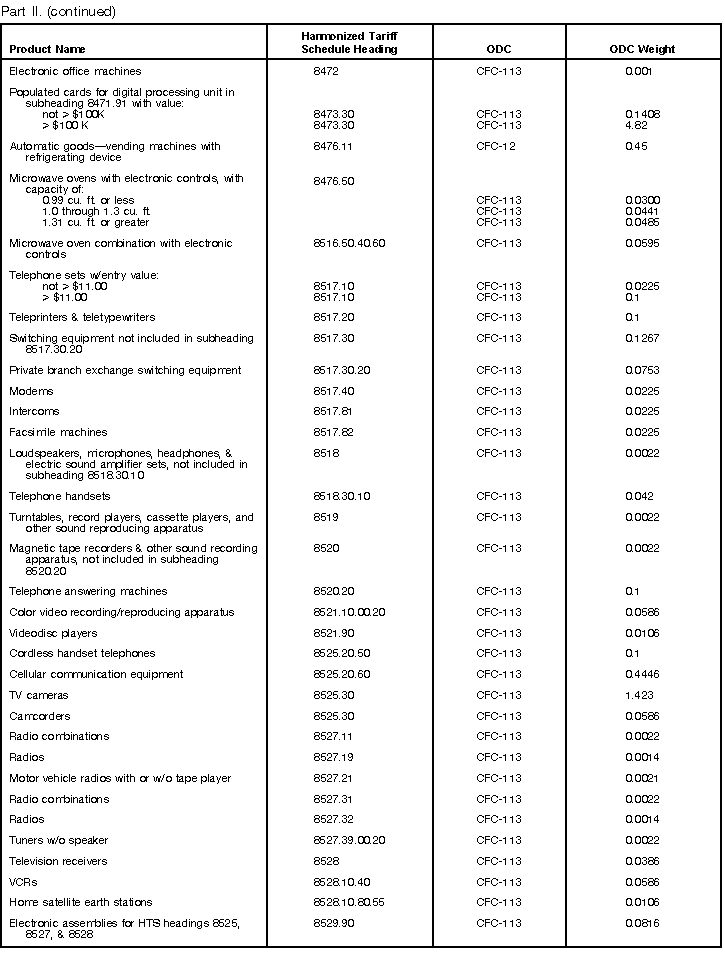
Imported Products Table, Part II continued
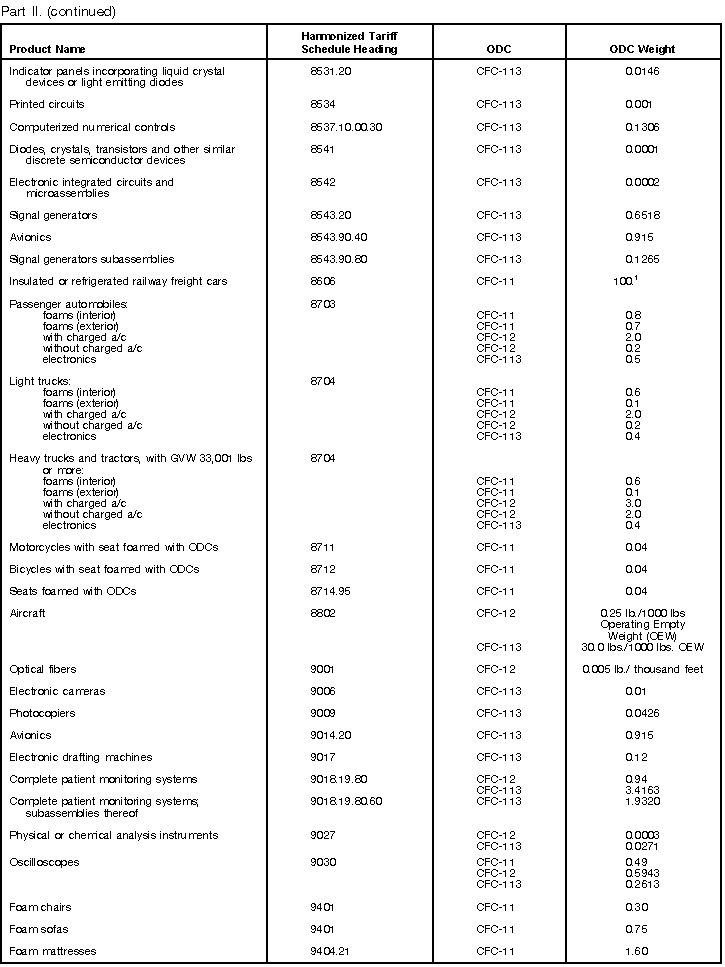
Imported Products Table, Part II continued
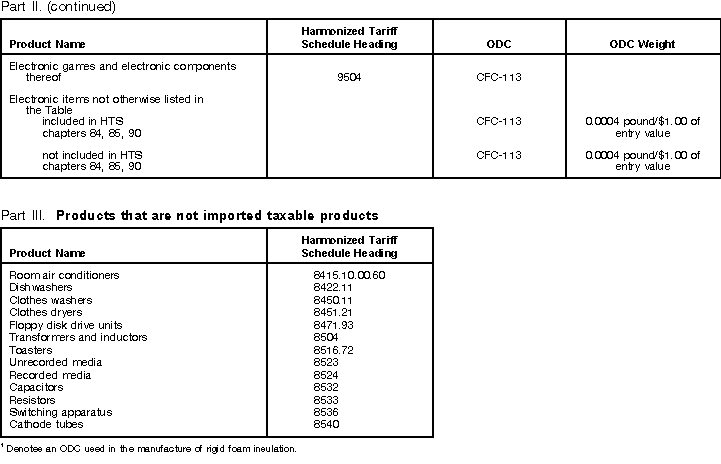
Imported Products Table, Part II continued and Part III
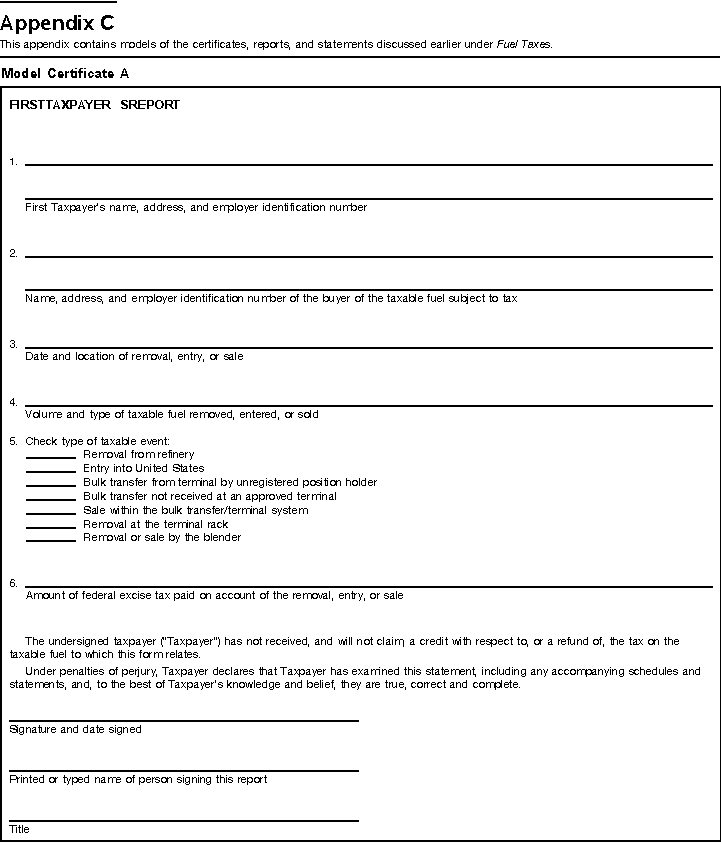
Model Certificate A
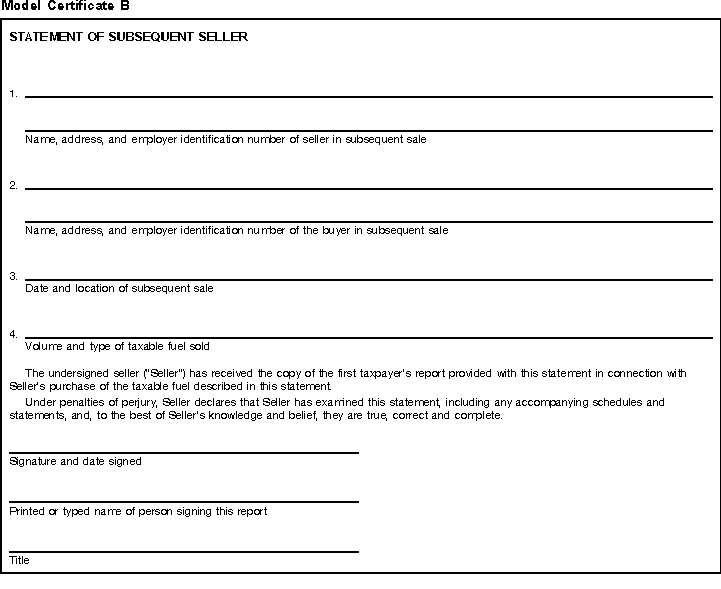
Model Certificate B
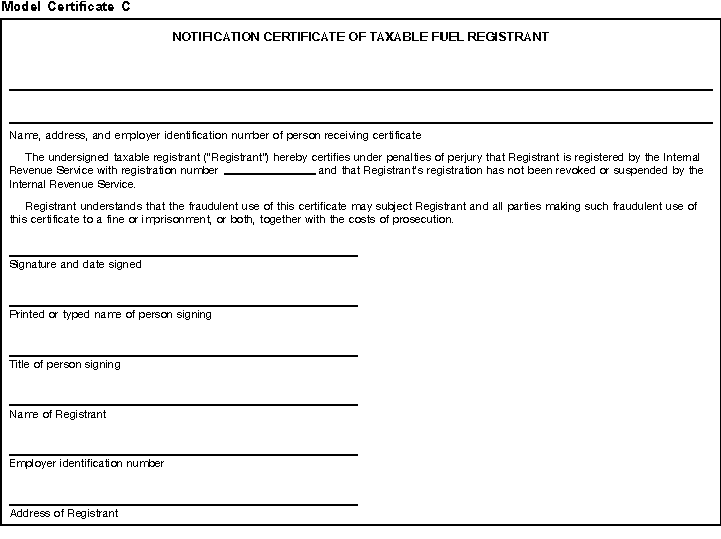
Model Certificate C
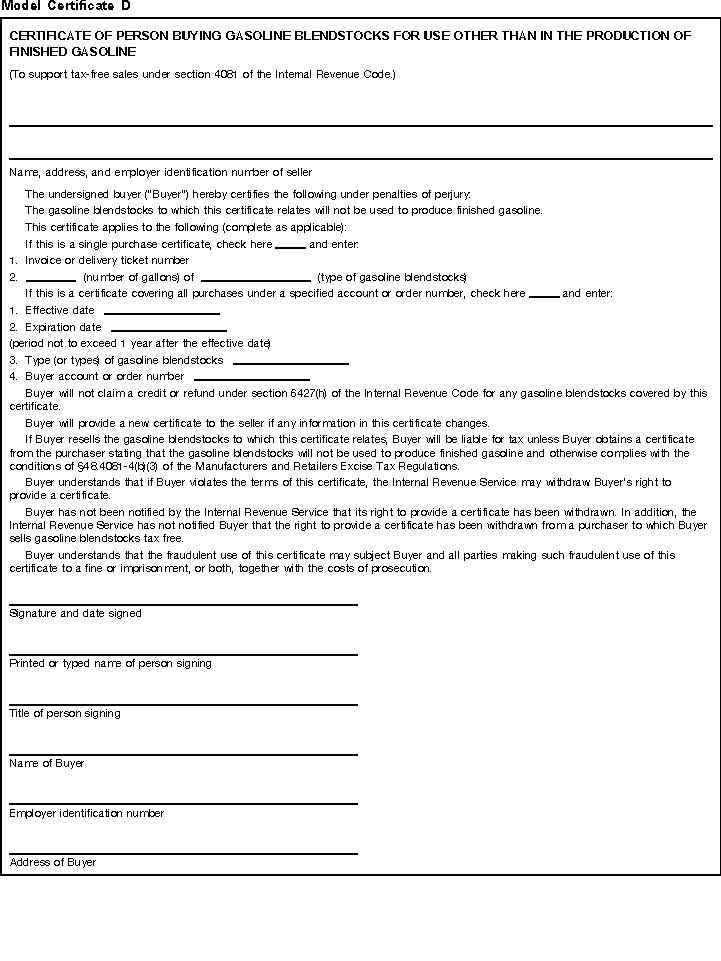
Model Certificate D
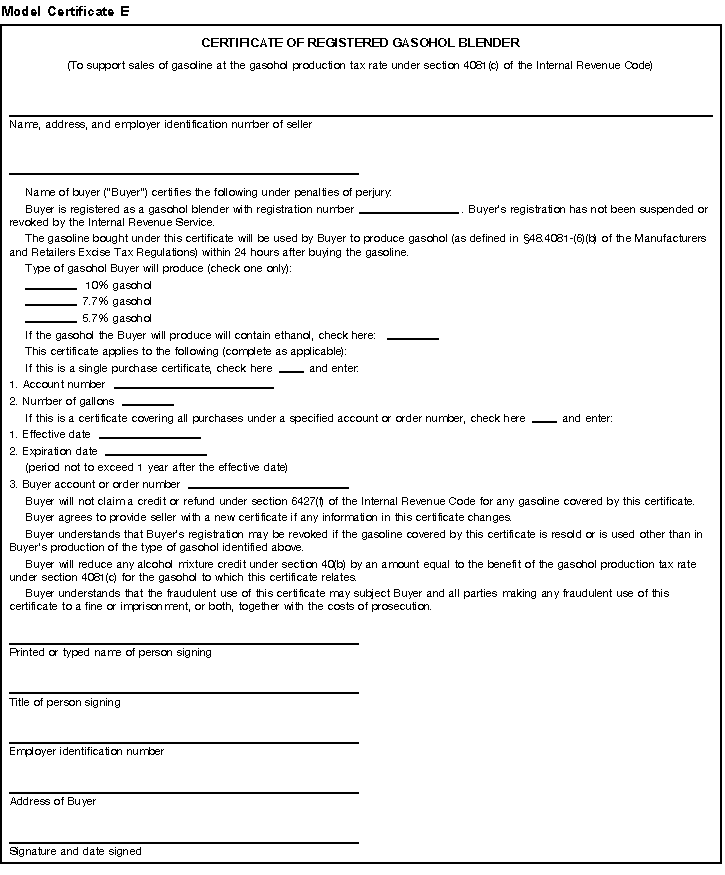
Model Certificate E
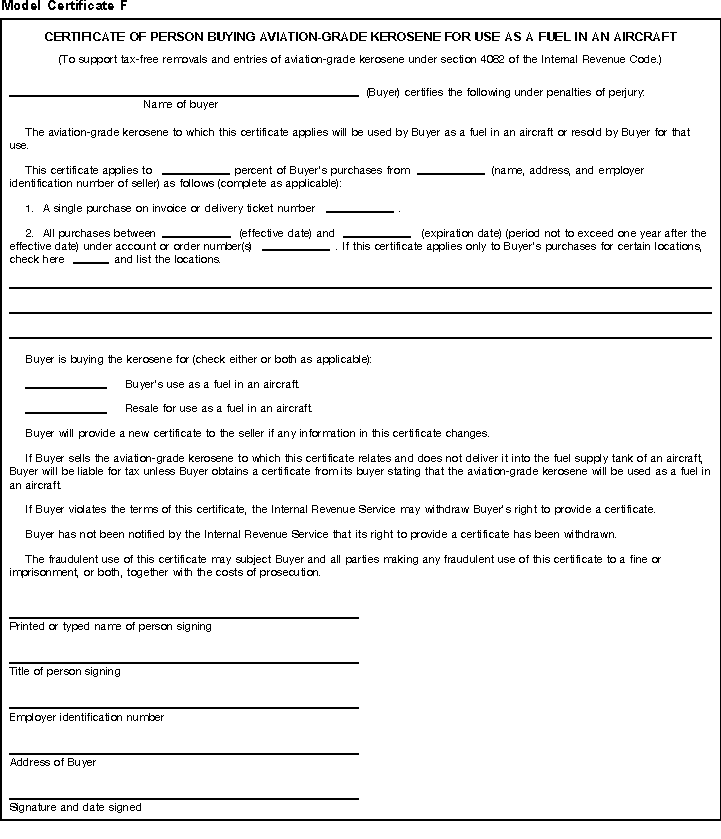
Model Certificate F
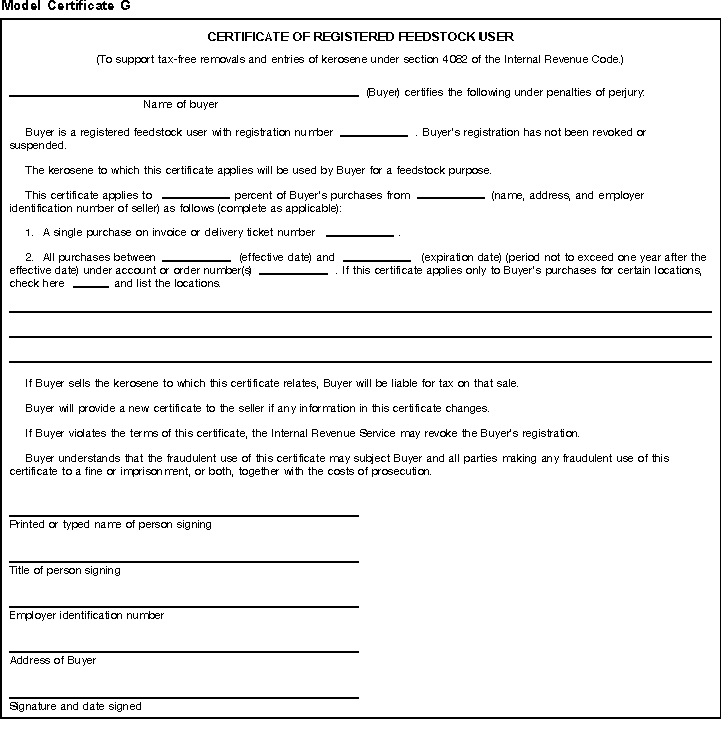
Model Certificate G
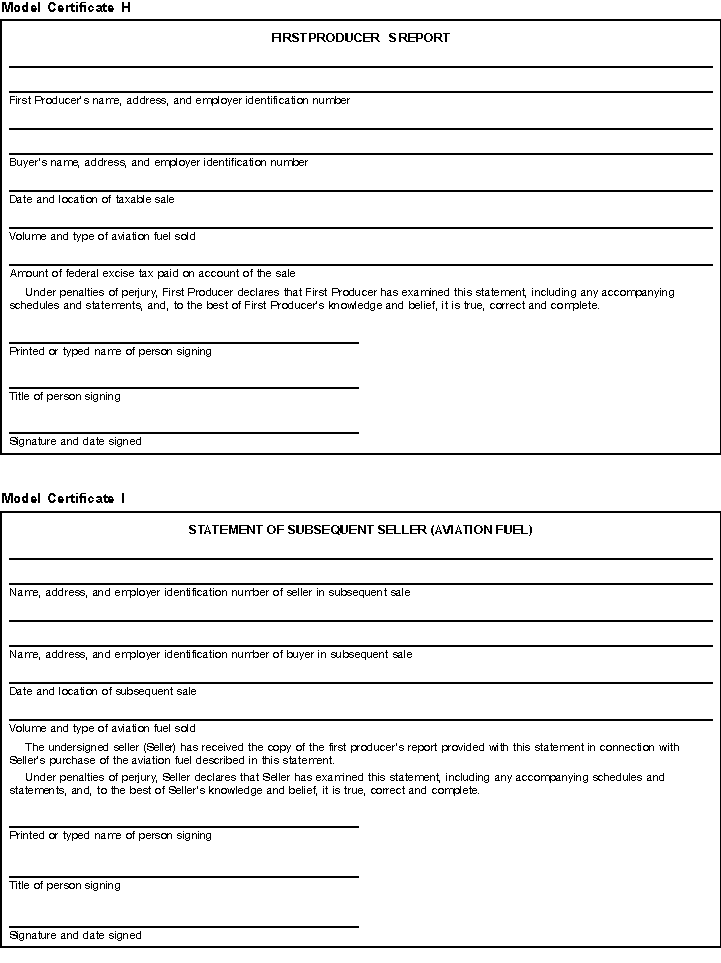
Model Certificates H and I
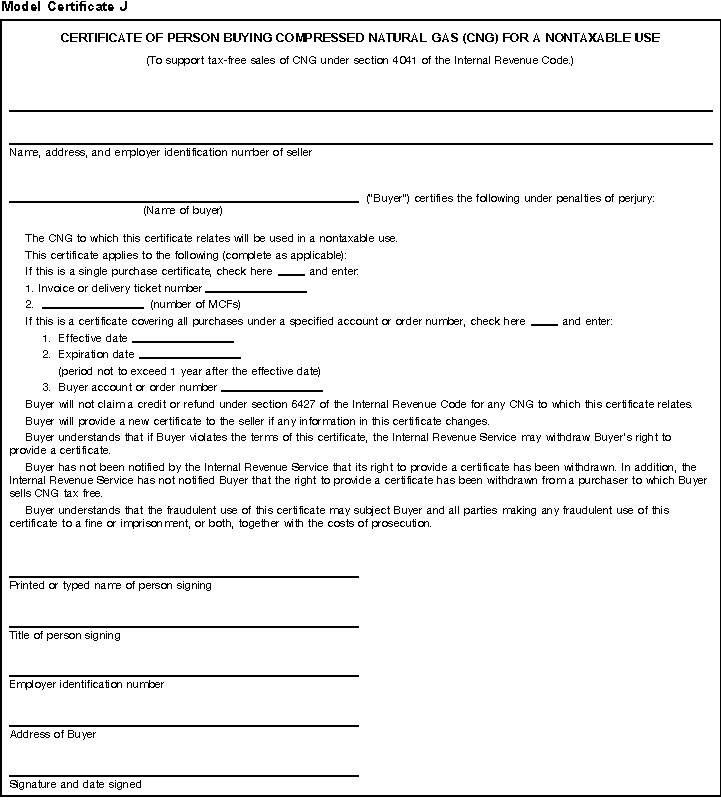
Model Certificate J
Previous | First
Publication Index | 2002 Tax Help Archives | Tax Help Archives | Home

 Report alternative method taxes deposited under the September rule on Form 720 for the 4th quarter.
Report alternative method taxes deposited under the September rule on Form 720 for the 4th quarter.
 Each person liable for the wagering tax must keep records to reflect each day's operations. Your records should include the following information.
Each person liable for the wagering tax must keep records to reflect each day's operations. Your records should include the following information. Personal computer. With your personal computer and modem, you can access the IRS on the Internet at www.irs.gov. While
visiting our web site, you can:
Personal computer. With your personal computer and modem, you can access the IRS on the Internet at www.irs.gov. While
visiting our web site, you can: TaxFax Service. Using the phone attached to your fax machine, you can receive forms and instructions by calling
703-368-9694. Follow the directions from the prompts. When you order forms, enter the catalog number for the form you need. The
items you request will be faxed to you.
TaxFax Service. Using the phone attached to your fax machine, you can receive forms and instructions by calling
703-368-9694. Follow the directions from the prompts. When you order forms, enter the catalog number for the form you need. The
items you request will be faxed to you.
 Phone. Many services are available by phone.
Phone. Many services are available by phone.
 Walk-in. You can walk in to many post offices, libraries, and IRS offices to pick up certain forms, instructions, and publications. Some
IRS offices, libraries, grocery stores, copy centers, city and county governments, credit unions, and office supply stores have an extensive
collection of products available to print from a CD-ROM or photocopy from reproducible proofs. Also, some IRS offices and libraries have the Internal
Revenue Code, regulations, Internal Revenue Bulletins, and Cumulative Bulletins available for research purposes.
Walk-in. You can walk in to many post offices, libraries, and IRS offices to pick up certain forms, instructions, and publications. Some
IRS offices, libraries, grocery stores, copy centers, city and county governments, credit unions, and office supply stores have an extensive
collection of products available to print from a CD-ROM or photocopy from reproducible proofs. Also, some IRS offices and libraries have the Internal
Revenue Code, regulations, Internal Revenue Bulletins, and Cumulative Bulletins available for research purposes.
 Mail. You can send your order for forms, instructions, and publications to the Distribution Center nearest to you and receive a response
within 10 workdays after your request is received. Find the address that applies to your part of the country.
Mail. You can send your order for forms, instructions, and publications to the Distribution Center nearest to you and receive a response
within 10 workdays after your request is received. Find the address that applies to your part of the country.
 CD-ROM. You can order IRS Publication 1796, Federal Tax Products on CD-ROM, and obtain:
CD-ROM. You can order IRS Publication 1796, Federal Tax Products on CD-ROM, and obtain:












